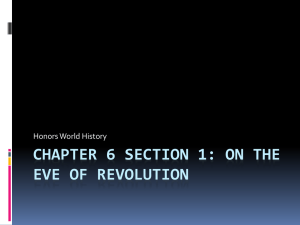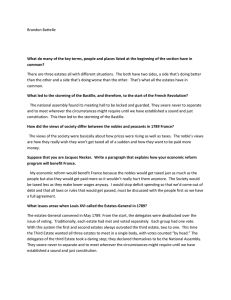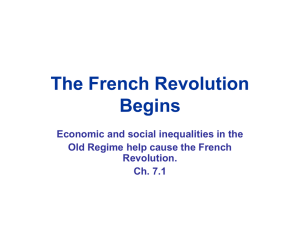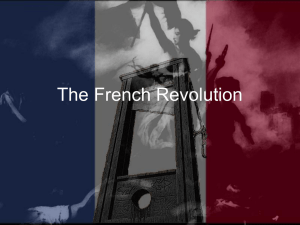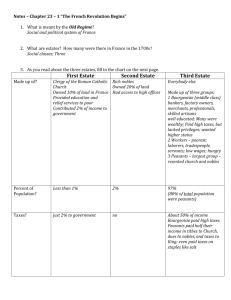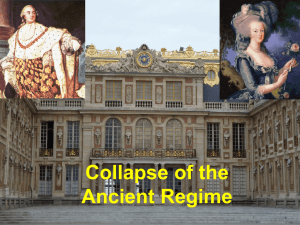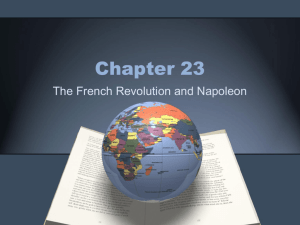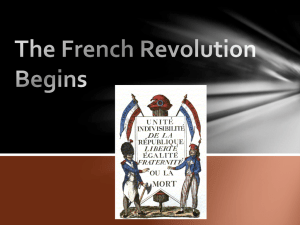THE FRENCH REVOLUTION BEGINS Chapter 7 Section 1
advertisement
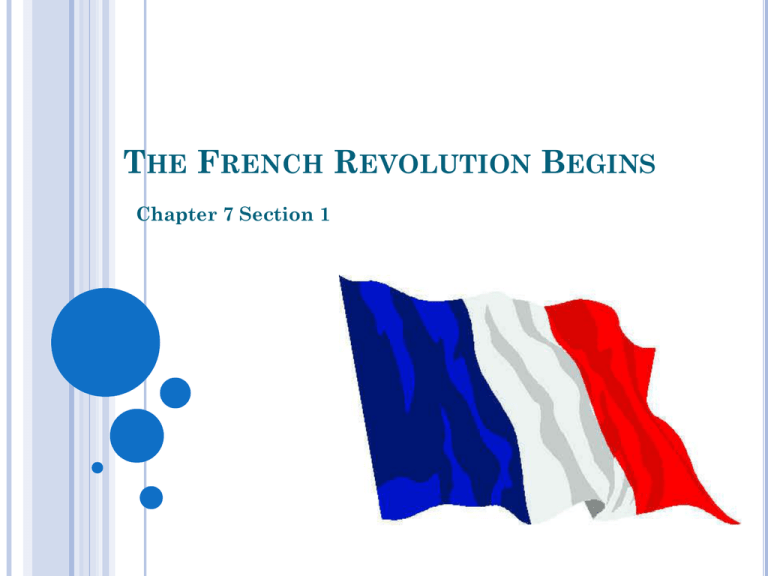
THE FRENCH REVOLUTION BEGINS Chapter 7 Section 1 MAIN IDEA Economic and social inequalities in the Old Regime helped cause the French Revolution. Throughout history, economic and social inequalities have at times led peoples to revolt against their governments. INTRODUCTION In the 1700s, France was considered the most advanced country in Europe. France was the center of the Enlightenment. French culture was widely praised and imitated. France’s appearance of success was deceiving. It was actually experiencing bad harvests, high prices, high taxes and trying deal with Enlightenment questions. THE OLD ORDER The Old Regime – the social and political system of France. Under this system the people of France were divided into three large social classes called estates. THE PRIVILEGED ESTATES First Estate – Clergy 1% of population Owned 10% of the land Second Estate – Rich nobles 2% of population Owned 20% of the land Both estates had access to high offices and exemptions from paying taxes. Scorned Enlightenment ideas as radical notions that threatened their status and power as privileged persons. THE THIRD ESTATE Third Estate – everyone else 97% of the population Three groups made up the 3rd Estate Bourgeoisie Workers Peasants BOURGEOISIE Middle class Bankers, factory owners, merchants, professionals and skilled artisans. Well educated & supported Enlightenment ideas. Liberty & equality Some were richer than nobles but had to pay high taxes. Lacked privileges of the First and Second Estates. Did not have the same social status and political power. WORKERS Poorest group Tradespeople, apprentices, laborers and domestic servants. Low wages and high unemployment rates. Often went hungry or resulting in stealing. PEASANTS Largest group 80% of population Paid half their income in dues to nobles, tithes to the church and taxes to the king’s agents. Paid taxes on basic staples (ex. salt). Resented nobles and clergy. Greatly desired change. WHO IS CARRYING SOCIETY? THE FORCES OF CHANGE Other factors, besides resentment, that led to the revolutionary mood in France: New ideas about government Serious economic problems Weak and indecisive leadership ENLIGHTENMENT IDEAS The Third Estate was inspired by the success of the American Revolution. Began to question the structures of society. Quoted Rousseau and Voltaire and argued for equality, liberty and democracy. ECONOMIC TROUBLES By the 1780s, France’s economy was in decline. On the surface the economy appeared fine, but it was impossible to make a profit due to the heavy taxes. The cost of living was rising. Bad weather caused crop failures. 1789 – the price of bread doubled. GOVERNMENT DEBT 1770s and 1780s – France’s government sank deeply into debt. Why? Extravagant spending of King Louis XVI and Marie Antoinette. Louis was left with a huge debt when he took the throne. He also spent a lot of money helping the colonists in the American Revolution. Doubled France’s debt. 1786 – bankers refused to loan the government any more money. A WEAK LEADER Louis XVI – indecisive and paid little attention to government advisors. Marie Antoinette interfered with the government and offered poor advice. Marie was a member of the Austrian royal family unpopular with the French. Marie spent lots of money on gowns, jewels, gambling and gifts Madame Deficit. ESTATES-GENERAL Instead of cutting expenses, he decided to impose taxes on the nobility. The Second Estate forced him to call a meeting of the Estates-General to approve the new tax. Estates-General – an assembly of representatives from all three estates. DAWN OF THE REVOLUTION In the past, the clergy and the nobles had dominated the Estates-General. Medieval rules – each estate got one vote Who do you think was usually outvoted? What is the problem with this system? THIRD ESTATE READY FOR CHANGE The Third Estate delegates were eager for government change due to their Enlightenment beliefs. They urged for each delegate to have one vote, not each estate. The Third Estate had as many delegates as the other two estates combined. NATIONAL ASSEMBLY The king sided with the nobles and enforced the medieval rules. Upset with this ruling, the Third Estate decided to work under the name National Assembly and pass laws and reforms in the name of the French people. The National Assembly voted to abolish the absolute monarchy and begin a representative government. TENNIS COURT OATH Three days later, the Third Estate was locked out of their meeting room. They moved their meeting to a Tennis Court and vowed not to leave until they drew up a Constitution. This pledge = Tennis Court Oath Some nobles and clergy joined the Third Estate. Louis got scared and stationed Swiss guards around Versailles. RUMORS PREPARATION Rumors spread in Paris. People said that Louis was going to use his army to dismiss the National Assembly. Others said that the troops were going to massacre French citizens. Citizens got scared and armed themselves. STORMING THE BASTILLE July 14, 1789 – citizens in search of gunpowder and weapons stormed a French prison, the Bastille. The mob overpowered the guard and took control of the building. The mob killed a few guards, placed their heads on pikes and proceeded to march through the streets. Fall of the Bastille became a great symbolic act of revolution. July 14th – Bastille Day ~ our Independence Day. DISCUSSION QUESTIONS Were the citizens justified in storming the Bastille? Why or why not? Would you have participated? Why or why not? A GREAT FEAR SWEEPS FRANCE Rumors spread throughout France. This senseless panic became known as the Great Fear. Out of fear that the nobles were going to terrorize the peasants, the peasants became outlaws themselves. Peasants broke into nobles’ houses and destroyed legal papers that bound them to pay feudal dues. EXPENSIVE BREAD AND ANGRY WOMEN Parisian women were outraged at the price of bread. They marched to Versailles in protest. First, they demanded the National Assembly take action. Then, they turned on the king and queen. Killed some royal guards. Demanded that Louis and Marie return to Paris. MADAME DEFICIT LEAVING VERSAILLES Louis finally agreed. The king, his family and servants left Versailles, never again to return. Their exit signaled the change in power and radical reforms about to overtake France.
